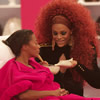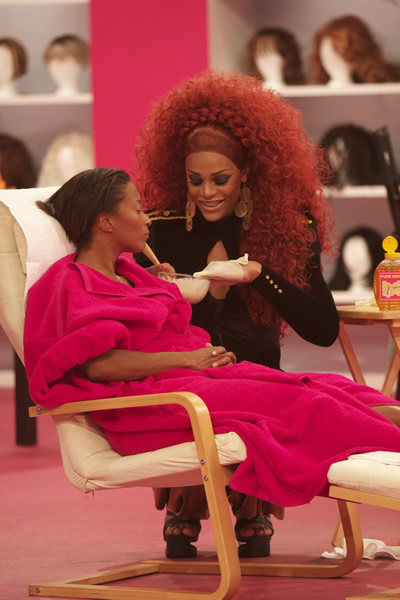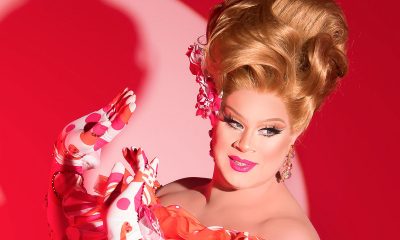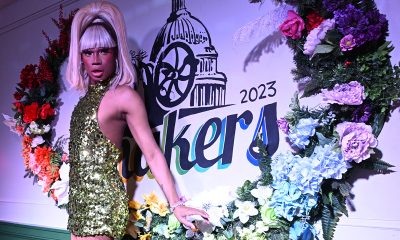Arts & Entertainment
Logo broadens programming
MTV-owned brand keeps Ru shows but gets less LGBT specific


Drag ‘professor’ Tyra Sanchez gives a facial on Logo’s ‘Drag U’ in episode 209 with guest star Raven-Symone. (Photo by Aaron Young, courtesy Logo)
Logo, the gay and lesbian-themed cable channel launched by MTV in 2005, has announced a new programming slate that is already causing some controversy.
A February press release said “Logo is evolving its programming focus with new series and development deals that reflect gays and lesbians’ increasing integration into mainstream culture today and their desire for shows that appeal to their multiple interests. In the six years since Logo launched, there has been a seismic shift in culture and the network’s new programming slate reflects that.”
Logo has worked with the Starcom Mediavest Group to study the programming interests of the LGBT community. “The gay community continues to evolve in size, influence and identity,” said Esther Franklin, head of SMG Americas Experience Strategy. She notes that their research allows them “to understand the needs of this critical community as they emerge and to paint a clearer, more specific picture of what’s meaningful and relevant in their lives.”
Based on that research, Logo executives have concluded that while most gays and lesbians do not hide their sexuality (52 percent), most also do not prefer living and socializing in exclusively gay and lesbian communities. “Culturally, we’re past the tipping point. For gays and lesbians, it’s part of who they are, but they don’t lead with it, because many are leading fully integrated, mainstream lives,” said Lisa Sherman, executive vice president of Logo. “Our goal at Logo has always been to honestly reflect our viewers’ lives. We’re now reinforcing our commitment to them with programming that truly mirrors how many of them are living and want to be entertained today.”
The evolution of Logo programming starts with a tweaking of one of the network’s flagship shows, “RuPaul’s Drag U” which will be back for an even “draggier” third season. The show currently features RuPaul and her drag queen assistants giving “diva makeovers” to “fashion-challenged” women. Just like the popular “RuPaul’s Drag Race,” these makeovers include sequins, wigs and coaching for the lip-synch performance of a lifetime (“Lip Synch for your life!”). The new season will also include practical tips on hair, makeup and wardrobe so that the “draguates” can apply their new-found style and confidence to their everyday lives.
The evolution continues with the other shows on Logo’s development slate. “Eden Wood’s World” (already in production) will feature even more sequins and tiaras than “RuPaul’s Drag U.” At the age of 6, Eden, who was featured on TLC’s “Toddlers and Tiaras,” has already retired from the junior competition pageant circuit after winning more than 300 crowns. Now she will travel the country with her mother, her manager and her publicist to help other girls achieve their dreams of stardom while she pursues her own dream of becoming an actress/singer/model/
Another show already in production is “The Baby Wait.” Developed by the ream behind such hit shows as “Teen Mom” and “Pregnant at Sixteen,” the series will chronicle the process of open adoption and the real “modern family” that’s formed. The show will follow not only the adoptive parents, but also the biological mother after her child is adopted, and will include straight couples, gay and lesbian couples and single parents.
Other shows on Logo’s development slate include:
“Scandalicious,” a countdown show with flair.
“Wiseguys,” a screwball comedy about Michel Verdi and her crazy Italian family: her long-suffering husband Jay, her Mafioso father (newly released from prison), her mother and new step-father, her gay brother and her zany, boy-crazy cousin.
“Design My Dog,” where teams of dog owners and fashion designers compete for prizes for the finest in doggie couture.
“Love Lockdown,” which features an unorthodox therapist who leads a variety of couples through an intensive 24-hour therapy session.
And, “Outrageous,” a fresh look at the most intriguing and shocking stories in pop culture (like gay Republicans and Kim Kardashian’s expensive wedding and brief marriage).
Not surprisingly, LGBT critics are already looking askance at the shift in Logo’s programming. For starters, the network is belatedly following the broader trend in favor of reality shows and against scripted shows. More seriously, however, none of the new shows has an LGBT lead or are even strictly LGBT themed.
Writing in The Bilerico Project, television critic Victor Kerney expresses his confusion about the programming shift. He writes, “I can’t understand why the execs would take this route. If they wanted to reach a broader audience, they could start with a few scripted shows that showcase different aspects of our community, reality shows that go beyond gossip and sex and a serious news show … It feels like Logo is selling us out. Everything they stood for is being replaced to fit a more mainstream format. Yes, we want more diverse views of our community, but instead of giving us any positive images of LGBT people, we get ‘Design My Dog’?”

Friday, July 11
“Center Aging Friday tea Time” will be at 2 p.m. in person at the DC Center for the LGBT Community’s new location at 1827 Wiltberger St., N.W. This is a social hour for older LGBTQ+ adults. Guests are encouraged to bring a beverage of choice. For more details, email [email protected].
Women in Their Twenties and Thirties will be at 8 p.m. on Zoom. This is a social discussion group for queer women in the Washington, D.C. area and a great way to make new friends and meet other queer women in a fun and friendly setting. For more details, visit the DC Center’s website.
Go Gay DC will host “LGBTQ+ Happy Hour” at 7 p.m. at Firefly. This event is ideal for making new friends, professional networking, idea-sharing, and community building. This event is free and more details are available on Eventbrite.
Saturday, July 12
Go Gay DC will host “Family Fun Story Time” at 12 p.m. at Freddie’s Beach Bar & Restaurant. Join award-winning drag queen Tara Hoot for songs, stories, bubbles, puppets and dancing. It’s the feel-good event you didn’t know you needed. This event is perfect for kids and kids at heart. Attendance is free and more details are available on Eventbrite.
Miss Capital Pride will host “DC Drag brunch on Rooftop – Penthouse” at 12 p.m. at MXDC Cocina Mexicana. Guests will experience a Mexican brunch infused with Baby Shank’s signature dishes, complemented by delicious margaritas and mimosas, all within the beautiful and spacious atmosphere of MXDC. There will also be outstanding performances by glamorous drag queens and celebrated celebrity impersonators, featuring Taylor Swift, Lady Gaga, Beyoncé, Britney Spears, Nicki Minaj, Ariana Grande, Whitney Houston, Cher, and many more. Tickets cost $30.65 and are available on Eventbrite.
Sunday, July 13
The National Portrait Gallery will host “Stormé at Stonewall” at 1:30 p.m. This is a gallery talk with LJ Roberts and Charlotte Ickes. This exhibition is a light-box portrait of activist Stormé DeLarverie, who is said to have thrown the first brick at Stonewall—the uprising credited with launching the modern LGBTQ+ rights movement in 1969. Roberts created this unconventional portrait in response to DeLarverie’s absence in mainstream narratives about the history of the Stonewall rebellion. Attendance is free and more details are available on Eventbrite.
Monday, July 14
“Center Aging Monday Coffee Klatch” will be at 10 a.m. on Zoom. This is a social hour for older LGBTQ+ adults. Guests are encouraged to bring a beverage of choice. For more details, email [email protected].
Genderqueer DC will be at 7 p.m. in person at the DC Center for the LGBT Community. This is a support group for people who identify outside of the gender binary, whether you’re bigender, agender, genderfluid, or just know that you’re not 100% cis. For more details, visit genderqueerdc.org or Facebook.
Tuesday, July 15
Center Bi+ Roundtable will be at 7 p.m. on Zoom. This is an opportunity for people to gather in order to discuss issues related to bisexuality or as bi individuals in a private setting.Visit Facebook or Meetup for more information.
Wednesday, July 16
Job Club will be at 6 p.m. on Zoom. This is a weekly job support program to help job entrants and seekers, including the long-term unemployed, improve self-confidence, motivation, resilience and productivity for effective job searches and networking — allowing participants to move away from being merely “applicants” toward being “candidates.” For more information, email [email protected] or visit thedccenter.org/careers.
Thursday, July 17
The DC Center’s Fresh Produce Program will be held all day at the DC Center for the LGBT Community. People will be informed on Wednesday at 5 p.m. if they are picked to receive a produce box. No proof of residency or income is required. For more information, email [email protected] or call 202-682-2245.
Virtual Yoga with Charles M. will be at 7 p.m. on Zoom. This is a free weekly class focusing on yoga, breath work, and meditation. For more details, visit the DC Center for the LGBT Community’s website.
Lit Lovers: Book Club for Seniors will be at 2 p.m. on Zoom. The book selection for July is “Rubyfruit Jungle” by Rita Mae Brown. For more details, visit the DC Center’s website.
Poly Discussion Group will be at 7 p.m. on Zoom. This is an inclusive, welcoming, virtual safer space to talk about all things polyamorous — the rapturous, the confused, the pure YIKES, we want to hear them all. For more details, email [email protected].
Television
ICYMI: ‘Overcompensating’ a surprisingly sweet queer treat
A sweet, savvy show about breaking free to embrace your true self

Pride month 2025 is now behind us, and while it’s safe to say that this year’s celebrations had a darker edge than usual, it’s also true that they came with a particularly rich bounty of new queer movies and shows to entertain us – so many, in fact, that even if we are facing a lull until the fall another harvest of fresh content, there are still plenty of titles – which, for whatever reason, were off your radar – for you to catch up on in the meantime.
One of the most notable of these – the bingeworthy series “Overcompensating” (now streaming on Amazon Prime) – will most definitely have been ON the radar for the plentiful fans of creator and star Benito Skinner, the actor/comedian who rose to viral fame through his content on platforms like Instagram, YouTube, and TikTok. For anyone else, it might have easily slipped through the cracks.
Created and written by Skinner as a loosely autobiographical “college comedy,” it aims for the kind of raucous, explicitly sexed-up tone one expects from the genre as it centers on Benny (Skinner), newly arrived as a freshman at prestigious Yates University. A former football jock and “golden boy” at his midwestern high school, he’s the picture of idealized youthful masculinity; he’s also deep in the closet, struggling to keep his sexuality hidden and maintain his macho front under the intense scrutiny of the college’s social scene – and under the resentful eye of his older sister Grace (Mary Beth Barone), who has already secured her own place at the top of the pecking order.
In the first episode, Benny’s difficulties are eased when he meets Carmen (Wally Baram), another freshman trying to navigate the politics of college life; a gamer from a home marred by tragedy, she’s an outsider who feels like she’s putting on an act, too, and they click – giving him the convenient “cover” of female companionship while providing them both with much-needed support and encouragement. He’s also befriended by a handsome film major from England (Rish Shah), who has already caught his eye, stirring other kinds of feelings and possibly even reciprocating them. Meanwhile, he’s being courted by the school’s “exclusive secret society” – headed by his sister’s aggressively “alpha” boyfriend Pete (Adam DiMarco) – and trying to stay interested in his studies, despite a growing realization that a career in business doesn’t actually appeal to him all that much.
That’s a lot to juggle for anybody, even an overachiever like Benny – whose “lucky” life so far has largely been the result of playing a role he is finding harder and harder to maintain. As the series goes on through its eight-episode arc, it becomes clear that he’s not the only one who is “keeping up appearances,” and he, along with the other confused and damaged young people in his orbit, begins the painful (but often hilarious) process of evolution that is required in order to become truly oneself.
Directed toward appealing to a younger demographic, “Overcompensating” is the kind of show that requires a few episodes worth of invested time to make an impression that feels like substance. Full of the bawdy farcical antics that go hand in hand with stories about hormonally charged college kids, it’s not above leaning into the formulas and tropes that have always driven these kinds of comedies. At first, while its broadly comedic strokes and frequently explicit sexual hijinks might elicit plenty of chuckles, the show might easily feel tiresome for more mature audiences; there’s a nostalgic fun to it, made even more appealing, somehow, by the “political incorrectness” of its frequently sexist and homophobic humor, but for a while things may feel like an unnecessary attempt to reinvent “Animal House” for the Gen Z crowd.
By the time the season reaches its halfway point, however, things have started to get real. The antics of these horny almost-adults take on a more pointed absurdity, informed by the increasingly tangled web of defensive deceit they weave among themselves – and, as things draw toward a cliffhanger climax, the consequences of maintaining it – until it achieves a sense of empathy toward them all. There’s a wisdom that smacks of lived authenticity underlying the whole affair, transforming it from the “sexploitative” teen comedy of its surface into something deeper. To be sure, things stay expectedly wacky, and the soap-operatic melodrama of its twists and reversals continue to maintain the show’s “mature YA” appeal; but beneath those trappings, by the end of the season a truer identity has begun to emerge, just as its characters have begun to find their own levels of self-actualization for themselves.
As creator, primary writer, and star, it’s obviously Skinner who deserves much of the credit. While it might be tempting, early on, to dismiss the show as an “ego project,” the internet-spawned sensation proves his talents quickly enough to get past such judgy suspicions, delivering a pitch-perfect blend of sauciness and sensitivity that extends its appeal toward both ends of the taste spectrum; just as crucially, he brings the same aforementioned “lived authenticity” to his winning performance – after all, he’s essentially playing himself in a fictionalized version of his own life – while also making sure that equal time (and compassion) is afforded all the other characters around him, each of whom are pushing at the boundaries of their own respective “closets,” too. It’s unavoidable to notice that – like most of his co-stars – he’s plainly a decade too old to be playing a college student; but by the time we reach that crucial halfway turning point, we’ve become too engaged by him to care.
The show is full of excellent performances, in fact. Relative newcomers Baram and Barone offer layers of complex nuance, while the more familiar DiMarco (“White Lotus”) is close to heartbreaking as the toxic BMOC clinging to the illusion of power as his life begins unraveling around him. Other standouts include the mononymic actress Holmes as Carmen’s “wild child” roommate, solidly likable turns as Benny’s parents from mature veterans Connie Britten and Kyle MacLachlan (whose presence, along with stylish elements in several key scenes, hints at an homage-ish nod to the late David Lynch), and podcaster Owen Thiele as an openly gay fellow student who has Benny “clocked” from the moment they meet. Finally, Lukas Gage makes a deep impression as a former high school teammate at the heart of Benny’s most haunting memory.
There’s no official word yet on whether “Overcompensating” will be renewed for a second season, despite the multiple loose ends left dangling at the end of its first; it has proven to be popular, and Skinner’s large fanbase makes it likely that the story will continue. Even if it doesn’t, the place of uncertainty in which it has left its characters rings true enough to serve as a satisfying endpoint.
As for us, we hope that won’t happen. For all its sophomoric humor, generic plot twists, and purposefully gratuitous sexual titillation, it’s one of the sweetest, kindest, and most savvy shows we’ve seen about breaking free from conformity to embrace your true self – and that’s a message that applies whether you’re queer, straight, or anywhere in between.
Photos
PHOTOS: Independence Day Weekend in Rehoboth
Wicked Green Pool Party, fireworks among festivities

Vacationers and residents alike enjoyed Independence Day Weekend activities in Rehoboth Beach, Del. The Wicked Green Pool Party drew hundreds to the CAMP Rehoboth fundraiser on Saturday. That evening, revelers went to the rooftops to watch the fireworks display.
(Washington Blade photos by Daniel Truitt)













-

 Federal Government2 days ago
Federal Government2 days agoTreasury Department has a gay secretary but LGBTQ staff are under siege
-

 Virginia3 days ago
Virginia3 days agoDefying trends, new LGBTQ center opens in rural Winchester, Va.
-

 District of Columbia2 days ago
District of Columbia2 days agoGay GOP group hosts Ernst, 3 House members — all of whom oppose Equality Act
-

 District of Columbia2 days ago
District of Columbia2 days agoD.C. police seek public’s help in July 5 murder of trans woman












